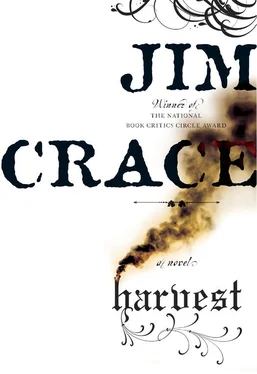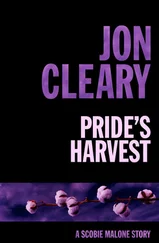I suppose it might have been partly this wanting to prove myself to them again and partly my ale-soaked lack of judgment — I’d loved the barley far too much last night and so could not be sound of mind — that made me bend and look more closely at the fairy caps. I only brushed them with my fingertips. All mushrooms are a fearsome sight and even worse to touch. These were as cold and high and clammy as a week-old corpse. But I suppose my brushing with my fingertips was enough for them to work their sorcery on me. I became their carrion at once. I’d given them a brief taste of my skin. Looking back from the more clear-headed safety of this afternoon, I can’t explain my madness or their sudden taking hold of me. But if I recall it correctly — though good recall isn’t something that has survived undamaged from this morning’s loss and doubling of senses — that timid brushing with my fingertips provided me the courage I had sought and lost so quickly drinking ale. I half remember reaching out and cupping mushrooms in my palms. I pinched them firmly at their stems. Against all reason, I wanted to discover what or who they tasted of.
Firstly, though, my country wisdom halted me. I had to make sure these were fairy caps. I picked a single one, the one least touched, the one least bruised, by the brushing, cupping, pinching of my hands, and pressed it to my nose. It’s said that if a fungus is harmful to eat, you’ll sneeze on smelling it. Its spores will warn you they’re not safe. I did not sneeze. I smelled the forest and the earth, the dampness of a fast-retreating year, the acridness of leaf mold, and a kitchen odor which I could have taken for yeast but yeast that was soured from neglect. I can only think that I was insanely hungry, or more damaged than I’d thought possible by Kitty Gosse’s ale and the nightmares that followed it, or suicidal, even, because I did not hesitate. The man who always hesitates did not, on this occasion, hesitate. He popped the mushroom in his mouth and started to chomp down on it. It did not taste as he expected it to.
The one and only time I tasted fairy caps before, with John Carr when we were younger men, we’d soaked them first in honey. I remember they were sweet and sinewy. I don’t remember tasting this reasty mix of horse’s hoofs, burned hair and candle wax, nor the leather chewiness. All I could do was break and tear the mushroom with my teeth and swallow the pieces whole. I ought to have stopped after the first piece and let the mushroom declare itself. If there was any poison in its flesh and now in mine, then let it poison me in no great quantity. But he who dithers is a mouse, I heard my neighbors say. I would not allow myself to be a mouse. Only a townsman would be that timid. I finished that first fairy cap but, for an age, it produced nothing in me but a belch — and the certain knowledge, coming to me from thin air, that the one was “not enough,” that only three of them would bring the courage I required. I did not know what voice had whispered that number to me, but I was sure that three would do the trick. One for Brooker and one each for the twins. I would be as mad as they were on the day they played with fire. I wanted their immodest fits of laughter. So I picked another pair of fairy caps. I knew better than to chew this time. I swallowed them whole so quickly that I almost choked and coughed them up. I had to sit on the grass bank, among the willow roots, and catch my breath. What living fairy caps remained were growing in between my knees. I snapped and picked the surviving twenty or so, the ones I did not mean to eat, and tossed them toward Turd and Turf, waxy titbits for our happy pigs. And then I waited. I do remember that I stretched out on the still-damp ground and waited. Simply lingering.
I must have been expecting to experience again what has been beyond forgetting all these years: the dancing lights and merriment that John Carr and I encountered when we first tasted fairy caps, the melting trails that haloed everything. We were like sun-drenched butterflies and then we were like moon-struck moths. It was a blissful afternoon and night. I’ve not regretted it. What I hoped for most was the enormous fearlessness I’d felt, beneath that long-lost moon that went from pale to blue to red. But what came first this morning, before any melting haloes or oblivion, was a stretch of paralyzing dread. I feared that what I’d eaten were not fairy caps at all, but something much more poisonous and wrathful. I was alarmed. And with good cause. I hadn’t even been born, let alone become a villager, when it happened, but I have heard the tale so many times: one of the Kips’ great grandmothers picked by mistake some red-top toadstools thinking they were edible. She baked them with a rabbit she had snared. She poisoned both her husband and a son. She would have died herself except, as was the habit in those days, the men dined first; the women had their suppers cold.
I could not help but think this morning of the dying Kips and how they would have felt at first, like me, heavy and unsteady, sick. And how quickly — certainly before their pie had gone quite cold enough for the woman to come to table — they would have begun to cry out with the pain. Already I had stomach cramps, as if I’d eaten palsied meat and it was sitting in my gut just biding time. Just killing time, perhaps, before it started killing me. My time was up. Certainly the fairy caps were keen to keep me on the ground. They would prefer it if I sank into the grass, if I became as rooted to the soil as them. Though stand I must. If I wanted to survive the day, I had to stand and rest my arms against the flat trunk of a beech so that my stomach could heave enough — yet again — to bring up these mushrooms. Yet, no matter what I tried to do, my body was both too slow and too fast to offer any balance when I attempted to get to my feet. The fairy caps would have their wish granted unless I could reclaim all the bones in my legs and arms, which were as spongy as the mushrooms themselves; I lay out flat again, spread myself across the ground, and waited to sleep or die or send down roots and put out leaves. But at last I succeeded in raising myself high enough off the ground to rest on my arms and knees, like the commonest and most wretched of beasts. I gagged and coughed but nothing came, except a skein of spittle and the overwhelming stink of barley ale. And then I flattened out again.
I was lucky, though. I must have been. I have survived to tell the tale, although there’s not much of a tale to tell. Most of the day is robbed from me. Anything could have happened. What might not have happened? I’m aching, though. Whatever it is I’ve done was strenuous. What I recall is hugging animals, and finding gorgeous horrors on the grinning bark of trees, and endless tumbling. Everything was newborn and familiar. My heart beats wildly at the memory. One picture haunts me. I was pinioned to the ground, just weighted to the ground, a seed, expecting only to be wheat and wanting only to be wheat and hoping only for the spring. The plow was heading for my back. Its blade was close. Its blade would bury me. I heard the rattle of the beam and the gritty churning of the furrow. That was the worst and best of it.
After that the fairy caps began to let me go. I had a twin, a standing twin, who came to rescue me. This other one who had my face, who looked like me and smelled like me and sounded like me, had got me by my shoulders and I was being pulled. I was being gleaned by him. My head came up and back. My bones solidified at last. My sudden twin put me on my feet and made me sensible again. Then, as far as I remember it, I walked the bounds once more toward midday, saying my farewells and making good, freeing any animal that was still tethered or penned, closing all the cottage doors, bolting every shed and barn, shutting gates. I stood and stared across each field, recalling in my reverie how tended and how tilled our years had been, how finely grained our lives. I know I passed the church ground where we never had a church and never will. I know I spent some moments standing on the turf where Cecily still rests, and Lucy Kent as well. My feet were heavy, not with soil, but with a leaden weariness. I think I felt like oxen might feel, if they weren’t so innocent. Yoked to the troubles of the world. But then again, in parallel perhaps, I had a sense that I was flying for a while. At least, I seemed to see our land as Mr. Quill has seen it with his brushes and his pens, his charcoal and his paints — just patterns and patchworks, as beautiful as embroidered cloth, not real in any way, but far below and not quite reachable. Time and distance seemed to play no part. Color was the master. And then I was most like a dove, its cote destroyed by fire, circling in plumes of smoke, without the prospect of a roof at night.
Читать дальше












